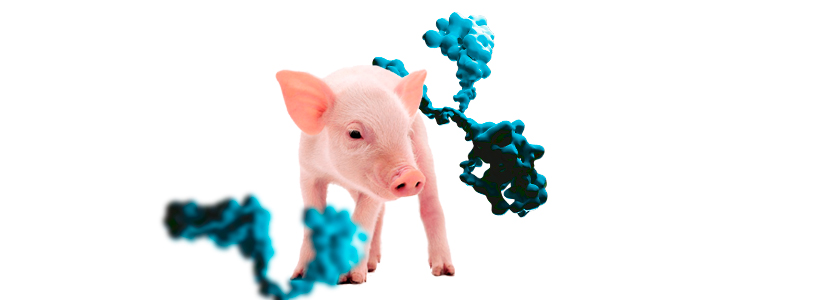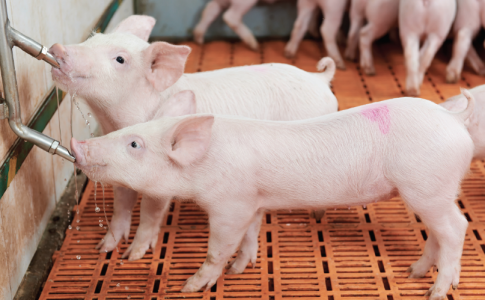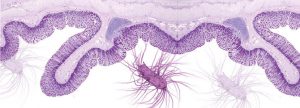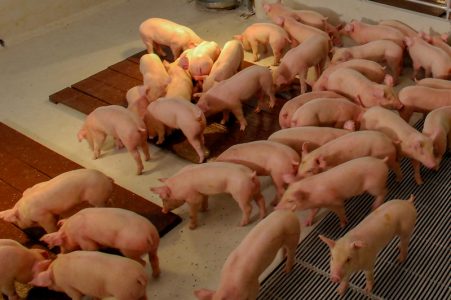Therefore, reducing the amount of protein that reaches the large intestine by selecting ingredients with highly digestible protein or reducing dietary protein levels can contribute to reducing the incidence of post-weaning diarrhea.
 12 Sep 2022
12 Sep 2022
Post-weaning diarrhea in piglets, and how to reduce its incidence?
The article Influence of the level of protein in the diet of pigs, mentioned the advantages of reducing the total content of crude protein in pig diets, without dwelling on a particular category.
This installment aims to review the benefits of reducing of the total amount of crude protein in weaned piglets, without neglecting the adequate supply of amino acids.
At weaning, feed is modified from liquid form (milk) to solids, accompanied by environmental, morphological and microbial changes within the piglet’s gastrointestinal (GI) tract. These changes are often associated with a high incidence of diarrhea during the post-weaning period.

Antimicrobial inclusion in feed has been widely implemented as an effective measure for the prevention of post-weaning diarrhea. However, the emergence of antimicrobial resistance sparked global concern regarding the negative effects associated with subtherapeutic antibiotic use. As a result, a ban on the use of antibiotics in feed was introduced in Europe in 2006 while the World Health Organization (WHO) published its Global Action Plan on AMR in 2015.
Therefore, it is essential to look for alternative nutritional strategies that help prevent post-weaning diarrhea. One of these is the reduction of crude protein (CP) in weaned piglets’ diets. Considering that undigested proteins and amino acids found within the small intestine are fermented by intestinal microbiota and this scenario leads to the onset of diarrhea.
[register]Some of these metabolites are beneficial to the host. As is the case with short-chain fatty acids which can be used as an energy source or to regulate cell proliferation and differentiation in the host.
When piglet diets contain excess protein, pH levels within the intestinal lumen increase to almost neutral conditions. This generates a favorable environment for the development of pathogenic bacteria such as Bacteroides and Clostridium species. Resulting in an increased incidence of diarrhea.
Therefore, reducing the amount of protein that reaches the large intestine by selecting ingredients with highly digestible protein or reducing dietary protein levels can contribute to reducing the incidence of post-weaning diarrhea.
CP levels in typical corn and soybean diets used for weaned piglets during their breeding phase (i.e. 7 to 20 kg body weight) normally vary from 21% to 25%. This depends on the hygienic situation of pig farms or production targets.
Therefore, it was suggested that CP reductions in the diet of weaned piglets should not be more than 2 percentage units below NRC (2012) recommendations. Considering the fact that other non-essential amino acids (NEAA) can become limiting, which will result in poor performance.

Intestinal morphology
Evidence suggests that low-protein diets could alleviate alterations in gut morphology induced by pathogenic bacteria while maintaining the normal digestion and absorption capacity of intestinal cells. However, a reduction of more than 4% resulted in significant reductions of villus height in the duodenum and jejunum. Despite the fact that diets were supplemented with L-isoleucine, L-valine, L-histidine and L-phenylalanine.
In general, reducing dietary CP levels within an adequate range of no more than 3 percentage units will not modify intestinal morphology.

Intestinal microbiota
The mammalian gut is colonized by thousands of different microbial strains. Reaching a total number of microbial cells that exceeds 1014. Fermentation of undigested dietary proteins is associated with increased proliferation of protein-fermenting bacteria.
Therefore, the source, quality and level of proteins found in feed can influence the microbial communities of piglets
[/register]
Subscribe now to the technical magazine of animal nutrition
AUTHORS

Nutritional Interventions to Improve Fertility in Male Broiler Breeders
Edgar Oviedo
The Use of Organic Acids in Poultry: A Natural Path to Health and Productivity
M. Naeem
Synergistic Benefits of Prebiotics and Probiotics in Poultry, Swine, and Cattle
Gustavo Adolfo Quintana-Ospina
Hybrid Rye Potential in Laying Hen Feed Rations
Gwendolyn Jones
A day in the life of phosphorus in pigs: Part I
Rafael Duran Giménez-Rico
Use of enzymes in diets for ruminants
Braulio de la Calle Campos
Minerals and Hoof Health in the Pregnant Sow
Juan Gabriel Espino
Impact of Oxidized Fats on Swine Reproduction and Offspring
Maria Alejandra Perez Alvarado